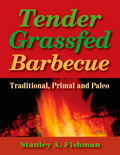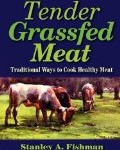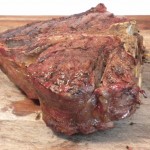When It Comes to Meat — Study the Studies First
By Stanley A. Fishman, author of Tender Grassfed Meat
It was the first hour of the first class on my first day in law school. The teacher, a man who actually practiced law during the day, and taught it at night, wrote a statement on the blackboard. I can still see the words in my mind. “There is no truth.â€
Being a believer in the truth of science in that time, I had to challenge that. I asked, “But what about scientific truth, established by properly conducted studies?â€
The teacher, an attorney of vast experience, answered—“No matter what position you take in a lawsuit, you can always find an expert to support it, and the expert can always find studies to support his position. You will find an expert who will testify that 2 plus 2 equals 3, and the other side will find an expert who will testify that 2 plus 2 equals 5. And each of them will find studies to support their completely contradictory positions. That is why there is no truth, at least not when you are practicing law.â€
After more than a quarter century as an attorney, I found his words to be absolutely true. Whenever there was an issue of science, psychology, medicine, or just about anything else, each side in the lawsuit was able to find an expert, often a superbly qualified scientist, to support their position. And every expert was able to find studies to support his or her support of that position.
This is not to say that every scientist is corrupt. But it does show that scientists who study the same issue often come up with results that contradict each other. The differences arise from the details of the study, the assumptions made that will be accepted as fact but not tested, and the bias, both subconscious and actual, of a scientist whose future income depends on pleasing the customer who is paying for the study. It is crucial to understand these factors before you accept the conclusions of a study as true.
Let us look at the studies on meat, for example. We have been bombarded for the last fifty years with study after study that claims that meat is unhealthy. According to various studies, meat causes heart disease, cancer, strokes, aging, and many other illnesses. In fact, if you believe all of these studies, it seems impossible for humanity to exist—given the fact that most generations of humans ate mainly meat and fat, you would have expected our ancestors to have died out from all these diseases long ago, rather than thriving and multiplying.
I have read study after study about meat. And one crucial fact emerges—nearly all of these studies treat all meat, whether raised with or without artificial hormones, raised with or without subtherapeutic antibiotics, fed their natural diet or an artificial one, fresh, or heavily processed meats loaded with preservatives and artificial chemicals, as being the same for the purposes of the study.
I have always found the assumption that all meat is the same to be flawed. This assumption makes it impossible to tell if the results are caused by the meat or by the chemicals, hormones, antibiotics, and preservatives added to some of the meat.
Two Swedish studies have shown how vital this detail is. The first study, done on Swedish women, treated all meat as being the same, and found that eating “meat†increased the risk of stroke. This study was heavily publicized by the Reuters news agency.
The second study, done on Swedish men, differentiated between fresh meat and processed meats. This study found that fresh meat made no difference in the risk of stroke. This study also found that eating meats processed with chemicals and preservatives did increase the risk of stroke, as shown in this article.
The conclusion I draw from these studies is that it is the chemicals and preservatives added to processed meats that are to blame for the increased stroke risk, not the meat itself.
I am aware of only one study that reviews the effect of grassfed meats on human health, but that study is the most extensive ever done. Dr. Weston A. Price studied traditional peoples eating the diets of their ancestors. Dr. Price actually visited every people he studied. The study lasted ten years, and is described in detail in Dr. Price’s magnificent book, Nutrition and Physical Degeneration. Dr. Price did not let bias interfere with his analysis—a very spiritual man, he had hoped and expected that these healthy peoples would be vegetarian, but faithfully reported the fact that they thrived on animal foods.
Most of the peoples studied by Dr. Price ate plenty of meat and fat as part of their traditional diet. The meat was grassfed or wild. No chemicals. None of these people had cancer, or heart disease, or stroke, or any of the chronic diseases that plague modern society.
Part of the findings of Dr. Price’s study is that grassfed meat and fat do not cause disease, but support the natural functions of the body, enabling these people to thrive. This is a conclusion I completely agree with.
This post is part of Real Food Wednesday and Fight Back Friday blog carnivals.
Related Post
RSS feed for comments on this post.
Sorry, the comment form is closed at this time.
Read more
« Traditional Barbecue Methods Are Worth the Effort
Finally! Modern Study Proves the Benefits of Grassfed Meat »


 Photos of recipes from the new book Tender Grassfed Barbecue
Photos of recipes from the new book Tender Grassfed Barbecue
 Photos of recipes from the cookbook Tender Grassfed Meat
Photos of recipes from the cookbook Tender Grassfed Meat

My Beef with the EWG’s Meat Eater’s Guide « Butter Believer posted on July 30, 2011:
[…] meat expert, Stanley, explains that to assume all meats are created equal in scientific studies, is flawed reasoning: […]
Agriculture Society » What’s the Real Scoop on Red Meat and Higher Mortality Rates? posted on March 16, 2012:
[…] been eaten all over the world by traditional societies for thousands and thousands of years. Â But not all meat is the same. One reason meat is getting the heat is that most meat people consume comes from animals in […]